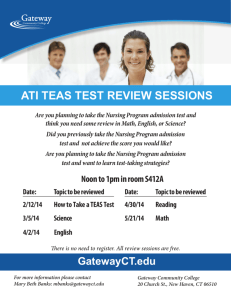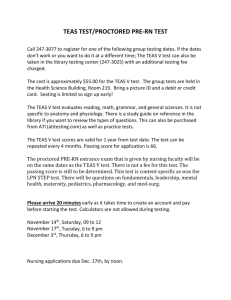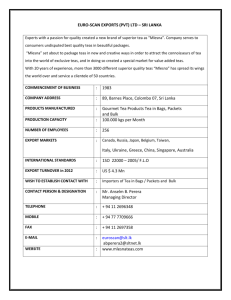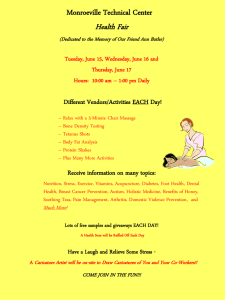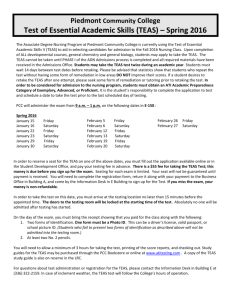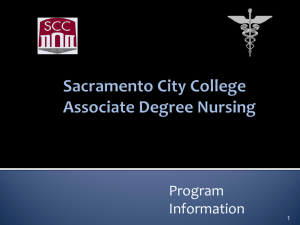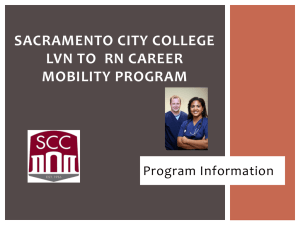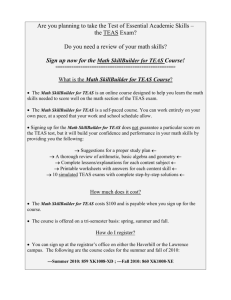IO 126 - Mt. San Jacinto College
advertisement
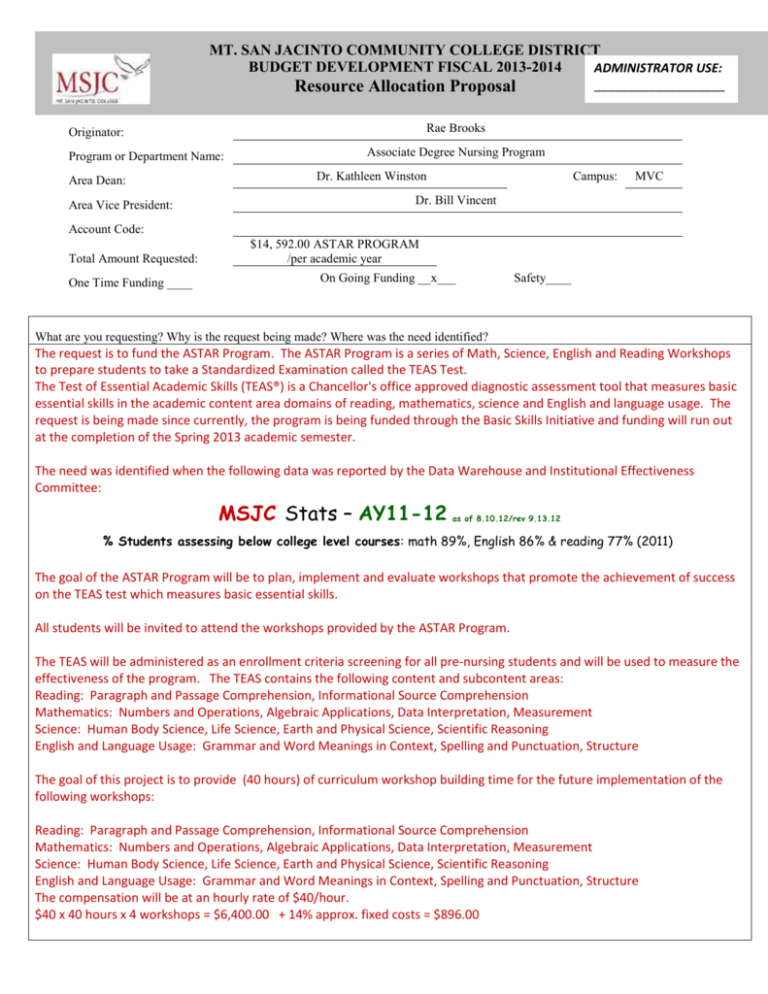
MT. SAN JACINTO COMMUNITY COLLEGE DISTRICT BUDGET DEVELOPMENT FISCAL 2013-2014 ADMINISTRATOR USE: Resource Allocation Proposal Rae Brooks Originator: Program or Department Name: Area Dean: Area Vice President: ___________________ Associate Degree Nursing Program Dr. Kathleen Winston Campus: MVC Dr. Bill Vincent Account Code: Total Amount Requested: One Time Funding ____ $14, 592.00 ASTAR PROGRAM /per academic year On Going Funding __x___ Safety____ What are you requesting? Why is the request being made? Where was the need identified? The request is to fund the ASTAR Program. The ASTAR Program is a series of Math, Science, English and Reading Workshops to prepare students to take a Standardized Examination called the TEAS Test. The Test of Essential Academic Skills (TEAS®) is a Chancellor's office approved diagnostic assessment tool that measures basic essential skills in the academic content area domains of reading, mathematics, science and English and language usage. The request is being made since currently, the program is being funded through the Basic Skills Initiative and funding will run out at the completion of the Spring 2013 academic semester. The need was identified when the following data was reported by the Data Warehouse and Institutional Effectiveness Committee: MSJC Stats – AY11-12 as of 8.10.12/rev 9.13.12 % Students assessing below college level courses: math 89%, English 86% & reading 77% (2011) The goal of the ASTAR Program will be to plan, implement and evaluate workshops that promote the achievement of success on the TEAS test which measures basic essential skills. All students will be invited to attend the workshops provided by the ASTAR Program. The TEAS will be administered as an enrollment criteria screening for all pre-nursing students and will be used to measure the effectiveness of the program. The TEAS contains the following content and subcontent areas: Reading: Paragraph and Passage Comprehension, Informational Source Comprehension Mathematics: Numbers and Operations, Algebraic Applications, Data Interpretation, Measurement Science: Human Body Science, Life Science, Earth and Physical Science, Scientific Reasoning English and Language Usage: Grammar and Word Meanings in Context, Spelling and Punctuation, Structure The goal of this project is to provide (40 hours) of curriculum workshop building time for the future implementation of the following workshops: Reading: Paragraph and Passage Comprehension, Informational Source Comprehension Mathematics: Numbers and Operations, Algebraic Applications, Data Interpretation, Measurement Science: Human Body Science, Life Science, Earth and Physical Science, Scientific Reasoning English and Language Usage: Grammar and Word Meanings in Context, Spelling and Punctuation, Structure The compensation will be at an hourly rate of $40/hour. $40 x 40 hours x 4 workshops = $6,400.00 + 14% approx. fixed costs = $896.00 Demonstrate how your request is supported by your Program Review/Annual Program Assessment: The request to fund the ASTAR Program is supported in the program review through what is written under Systematic Planning: The program has already incorporated ATI Testing to assist students in obtaining a better indicator of what their probability is of passing NCLEX. Section I The ASTAR Program assists with identifying strong prospective nursing students by providing remediation to successfully pass the TEAS Entrance Exam. The Chancellor’s office has data supporting the TEAS scores as an accurate predictor of student completion and in turn successfully passing the State Licensure Examination- NCLEX-RN upon completion of the program. Demonstrate how your request is supported by your Unit Plan and Division Plan (link to Unit/Division Plans 2011-2012) The Nursing and Allied Health Unit Plan indicates the following priorities under the ACTION PLAN which includes: Fund the Unit Fall Student Success annual event (aka Welcome Back BBQ) for new student orientation, instructional workshops, assessment testing, remediation and a wide range of student services activities. The ASTAR Program is a series of Math, Science, English and Reading Workshops to prepare students to take a Standardized Examination called the TEAS Test. The Test of Essential Academic Skills (TEAS®) is a Chancellor's office approved diagnostic assessment tool that measures basic essential skills in the academic content area domains of reading, mathematics, science and English and language usage. The request is being made since currently, the program is being funded through the Basic Skills Initiative and funding will run out at the completion of the Spring 2013 academic semester. The need was identified when the following data was reported by the Data Warehouse and Institutional Effectiveness Committee: MSJC Stats – AY11-12 as of 8.10.12/rev 9.13.12 Section I % Students assessing below college level courses: math 89%, English 86% & reading 77% (2011) The goal of the ASTAR Program will be to plan, implement and evaluate workshops that promote the achievement of success on the TEAS test which measures basic essential skills. The priority actions listed in the Nursing and Allied Health Unit Plan include: Immediate hire of two medical-surgical faculty to replace vacancy reassignment and retirement for the ADN Program to achieve compliance. Immediate hire of the grant funded Student Success Advisor/Counselor to achieve BRN compliance. Immediate hire of the grant funded Enrollment/evaluator/research Specialist to achieve BRN compliance. Immediate hire of one grant funded Clerk IV for the ADN Program to achieve BRN compliance. Immediate hire of full-time NAHU Skills/Simulation Lab Coordinator to replace the vacancy and achieve BRN compliance. Create and fund an Associate Dean/ADN Program Director. Hire of a baccalaureate prepared DMS faculty to achieve CAAHEP accreditation. Provide funds to support and sustain CAAHEP expenses for DMS accreditation. Provide funds to support CNA/HHA curriculum update to maintain state compliance. Hire a Clerical Assistant to support the Nursing and Allied Health Unit and provide back-up support to the ADN Program clerk. Fund the Par Score/Par Test maintenance contract. Purchase Class Climate software license to support Nursing and Allied Health required surveys. Fund the Unit Fall Student Success annual event (aka Welcome Back BBQ) for new student orientation, instructional workshops, assessment testing, remediation and a wide range of student services activities. Purchase and sustain Institutional Memberships for NAHU professional organizations and associations including but, not limited to DMS and ADN’s NLN Memberships. Provide travel/mileage reimbursement for preceptorship instruction in DMS and ADN Programs. Provide funds to support NLNAC accreditation planning activities and initial costs. Provide funds for the NLNAC accreditation preparation, site visit and sustainability. Provide resources for renovation of skills/simulation lab space for EMS/EMT program including relocation to modules 2008 and 2009 and advanced EMS Simulation Lab in module 2006. Provide increase in EMS/EMT Instructional Aide hours. Provide resources for faculty professional development, mentoring of new faculty and remediation of permanent faculty. Provide resources to support consulting experts for curriculum, accreditation and program development for current and future programs. Develop new and expand current clinical and educational partnership initiatives for Unit programs including but not limited to ADN to BSN and ADN to MSN tracks for MSJC students with CSUSM and Concordia University. Demonstrate how your request is supported by your CLO/DLO/PL0/AUO/SLO: The ASTAR Program funding request supports the Program Learning Outcome of: -Passing the national exam for licensure in the state of California and continue life- long learning. Section I The California Community College Chancellor’s Office maintains data that supports the implementation of a MultiScreening Enrollment Criteria based upon a student’s GPA, TEAS Test scores and life experience. There is also data that indicates a correlation between low TEAS Test scores and nursing program attrition. This is true specifically to the Math component of the TEAS Test. Through the continued implementation of remediation and workshops in place to prepare students to take the TEAS Test, there is a higher probability of a high TEAS Test scoring student to be admitted into the Nursing Program, completing the program, and passing the national exam for licensure (NCLEX) to become a Registered Nurse. Section II Describe how your request is aligned with one or more of the following Institutional Priorities: (link to SP) Student Success The California Community College Chancellor’s Office maintains data that supports the implementation of a MultiScreening Enrollment Criteria based upon a student’s GPA, TEAS Test scores and life experience. There is also data that indicates a correlation between low TEAS Test scores and nursing program attrition. This is true specifically to the Math component of the TEAS Test. Through the continued implementation of remediation and workshops in place to prepare students to take the TEAS Test, there is a higher probability of a high TEAS Test scoring student to be admitted into the Nursing Program, completing the program, and passing the national exam for licensure (NCLEX) to become a Registered Nurse. Fiscally Sound Position: Systematic Planning and Assessment: TEAS Test Data is used to identify and remediate “high risk” students that are in danger of academically failing out of the program. The California Community College Chancellor’s Office maintains data that supports the implementation of a MultiScreening Enrollment Criteria based upon a student’s GPA, TEAS Test scores and life experience. There is also data that indicates a correlation between low TEAS Test scores and nursing program attrition. This is true specifically to the Math component of the TEAS Test. Through the continued implementation of remediation and workshops in place to prepare students to take the TEAS Test, there is a higher probability of a high TEAS Test scoring student to be admitted into the Nursing Program, completing the program, and passing the national exam for licensure (NCLEX) to become a Registered Nurse. Institutional Pride and Organizational Culture: Section II The ASTAR Program will prepare students to take the Math, Science, Reading, and English Basic Skills TEAS Test through the forum of 1:1 remediation with faculty members, through formal class room setting workshops with other prospective nursing program applicants, and through continuous encouragement and mentoring support by faculty members. This three step approach to prepare the students promotes student engagement, sense of community, and a safe positive environment, and employee and student pride. Community Partnerships and Service Describe how your request will support one or more of the 12 Institutional Goals in the Strategic Plan (Strategic Plan) The goal of the ASTAR Program will be to plan, implement and evaluate workshops that promote the achievement of success on the TEAS test which measures basic essential skills. All students will be invited to attend the workshops provided by the ASTAR Program. The TEAS will be administered as an enrollment criteria screening for all pre-nursing students and will be used to measure the effectiveness of the program. The TEAS contains the following content and subcontent areas: Reading: Paragraph and Passage Comprehension, Informational Source Comprehension Mathematics: Numbers and Operations, Algebraic Applications, Data Interpretation, Measurement Science: Human Body Science, Life Science, Earth and Physical Science, Scientific Reasoning English and Language Usage: Grammar and Word Meanings in Context, Spelling and Punctuation, Structure Section III The workshops will satisfy the following Institutional Goals: Student Success ❶ Improve course completion rates. ❷ Accelerate “time-to-completion” rate for those students pursuing a transfer track. ❸ Integrate learning, engagement, access, and teaching initiatives that support student academics and personal growth. The California Community College Chancellor’s Office maintains data that supports the implementation of a MultiScreening Enrollment Criteria based upon a student’s GPA, TEAS Test scores and life experience. There is also data that indicates a correlation between low TEAS Test scores and nursing program attrition. This is true specifically to the Math component of the TEAS Test. Through the continued implementation of remediation and workshops in place to prepare students to take the TEAS Test, there is a higher probability of a high TEAS Test scoring student to be admitted into the Nursing Program, completing the program, and passing the national exam for licensure (NCLEX) to become a Registered Nurse. Systematic Planning and Assessment ❻ Emphasize College-wide data-driven assessment and decisionmaking utilizing internal and external data. TEAS Test Data is used to identify and remediate “high risk” students that are in danger of academically failing out of the program. The California Community College Chancellor’s Office maintains data that supports the implementation of a MultiScreening Enrollment Criteria based upon a student’s GPA, TEAS Test scores and life experience. There is also data that indicates a correlation between low TEAS Test scores and nursing program attrition. This is true specifically to the Math component of the TEAS Test. Through the continued implementation of remediation and workshops in place to prepare students to take the TEAS Test, there is a higher probability of a high TEAS Test scoring student to be admitted into the Nursing Program, completing the program, and passing the national exam for licensure (NCLEX) to become a Registered Nurse. Institutional Pride and Organizational Culture ❼ Promote quality institutional communication as a key priority and practice. ❽ Advance and celebrate student learning, sense of community, safe and positive environment, diversity, and employee and student pride. ❾ Promote more student engagement in campus life. The ASTAR Program will prepare students to take the Math, Science, Reading, and English Basic Skills TEAS Test through the forum of 1:1 remediation with faculty members, through formal class room setting workshops with other prospective nursing program applicants, and through continuous encouragement and mentoring support by faculty members. This three step approach to prepare the students promotes student engagement, sense of community, and a safe positive environment, and employee and student pride. III on Secti Demonstrate how your project goals are supported by any of the following plans (2009-16 Educational Master Plan, Distance Education Plan, Technology Plan and/or the Facilities Master Plan): Describe your goal(s) for this proposal? How will this impact students or institutional services? Section III What are your measureable outcomes that will lead to you meeting your goal(s)? Provide how your outcomes are tied to your CLO/DLO/PLO/AUO/SLO Section IV Measurable Outcomes that will lead to meeting the goals: 1. Passing the national exam for licensure in the state of California and continue life- long learning 2. Employer survey results 3. Graduate Employment data 4. Students also complete the following surveys to satisfy the California Board of Registered Nursing Program Accreditation requirements: a. Course Surveys/Instructor Surveys b. Clinical Setting Surveys c. Demographic surveys d. Skills Lab Learning Resource Surveys Section V What are the steps that you will take or need to be taken to implement this proposal? Demonstrate the following: • (a) Who is in charge of implementing the project? • (b) What are the projected start and end dates? • (c) What other departments will need to assist with the acquisition/ implementation of the project? • (d) When will the outcomes be measured? • (e) How will you measure the desired outcomes? What are the steps that you will take or need to be taken to implement this proposal? Demonstrate the following: • (a) Who is in charge of implementing the project? Raelene Brooks (AD Nursing Program Director) • (b) What are the projected start and end dates? On-going funding since the workshops will occur every semester • (c) What other departments will need to assist with the acquisition/ implementation of the project? NONE • (d) When will the outcomes be measured? At the end of each semester, there is an ASTAR Survey to find out if the learning outcomes of the program are achieved. These outcomes are assessed as requirement for the California Board of Registered Nursing Program Accreditation • (e) How will you measure the desired outcomes? 1. Successful passing of the TEAS Test 2. Enrollment into the Nursing Program 3. Completion of the Nursing Program 4. Successful passing of the NCLEX licensure examination on the first attempt Projected Expense Profile New Personnel Request--This does not include Full Time Academic Faculty Positions. For personnel requests please attach the job description, job classification and label "Exhibit I." Position Title:______________________________________ 1XXX Academic Salaries (Certificated) 3XXX Benefits Estimated Cost Position Title:______________________________________ 1XXX Academic Salaries (Certificated) 3XXX Benefits Estimated Cost Position Title:____________________________________________________ 2XXX Classified/Non Academic Salaries 3XXX Benefits 10, 11 or 12 Months Hours per Week_____ Position Title:____________________________________________________ 10, 11 or 12 Months 2XXX Classified/Non Academic Salaries 3XXX Benefits Hours per Week_____ Sub Total: Non Personnel Requests: Object Code Title 4XXX Supplies and Materials 5XXX Services Amount Requested 6XXX New Equipment or Building/Site Improvements Sub Total: - Total Budget Proposal: Secondary Effects (if this proposal is approved) For Personnel Requests: What additional space, if any, is needed to accommodate this position? If so, where is the proposed location? For Equipment and Technology Request Will additional space be needed to accommodate requested equipment? If so where is the proposed location? Will requested equipment require maintenance agreements and or support personnel? If so what are the projected costs? Please list future year anticipated needs and estimated financial needs. NOTE: This section refers to any anticipated funding not addressed by this RAP, but required in the future. This will not be automatically funded. A new RAP must be completed in future years. Fiscal Year Anticipated Need Estimated Amount Dean Approval Date Vice President Approval Date
